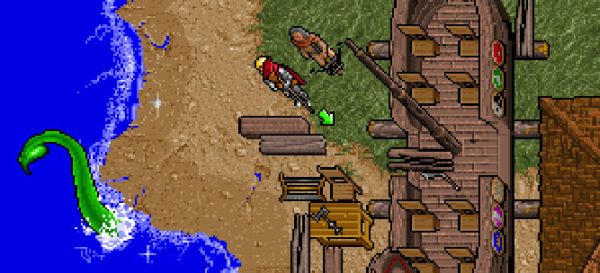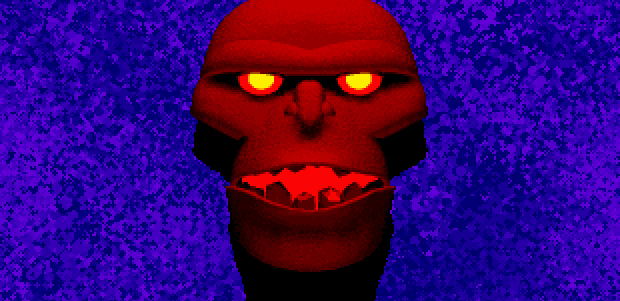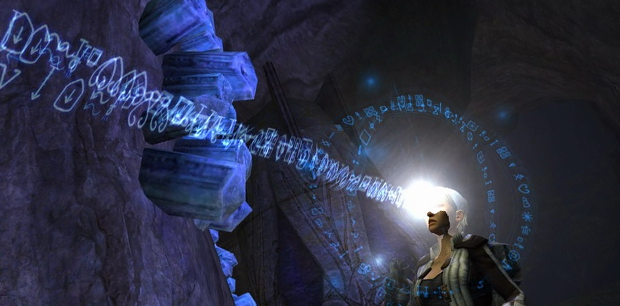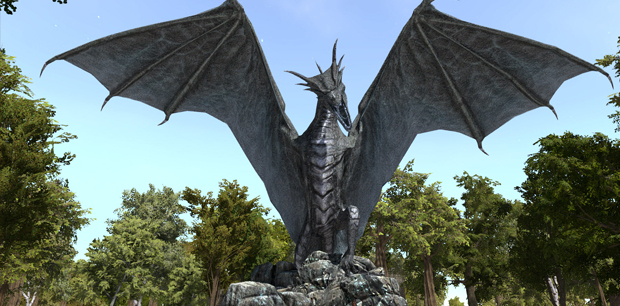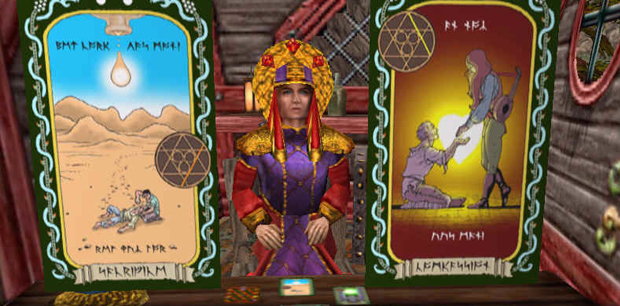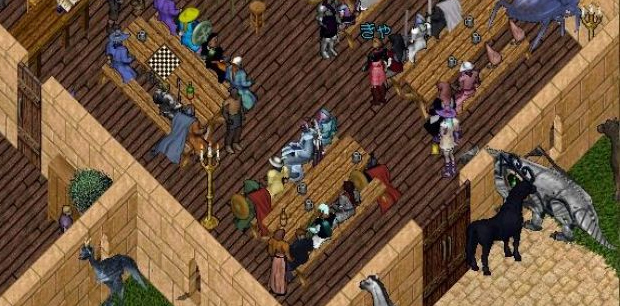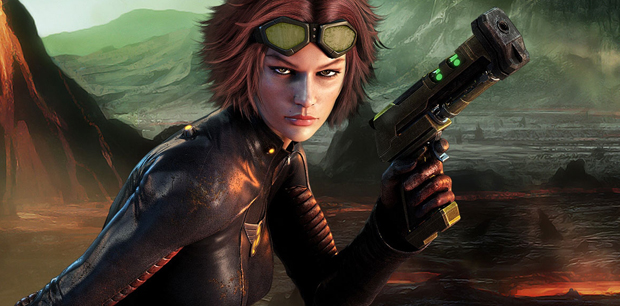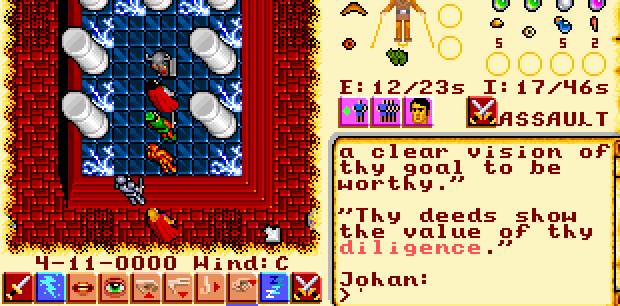The RPG Scrollbars: Richard Garriott's autobiography
Otherwise known as Adventure/Games
Explore/Create isn't your average autobiography. Certainly, not your average developer one. There aren't many that jump from 1980s corporate wranglings to literally being in space, nor which start not with the subject in the middle of a D&D game, but about to be crushed by the actual, literal Titanic. But that's Richard Garriott for you - a man who has always stood for what I personally believe is the finest goal in life. To earn vast amounts of money doing what you love... and then use it to buy a castle.
The sheer scope of this book makes for a great, though often bizarre read. Having spoken to Garriott a couple of times for things, I'm personally aware that you don't really interview him so much as start him talking and pretty much sit back with the tape recorder, occasionally awkwardly interjecting "That's a fascinating story, but my editor told me to ask about Kickstarter." The man owns vampire hunting kits. Plural.
Somewhat inevitably, the result is a bit like randomly jumping through a whole season of QI. Barely has an anecdote started than we're off somewhere else. Chapter 12 for instance is the creation of Ultima Online. Chapter 11 is Garriott and pals raiding a sunken probable slaver ship. If you don't already roughly know Garriott's story, expect a lot of "Wait, what?!" moments, like a discussion of the creation of the pictographic language used in Tabula Rasa just casually throwing in "By the way, I took it into space with me for marketing purposes." Or later, "I nearly drowned the mayor of Austin."
Every chapter, in short, gives no real care for the overall flow, though it does more or less tend to follow chronological order from the early days to now, oddly minus any reference of Shroud Of The Avatar. They're individually self-contained as you'd expect, but the jumps between them - most of them split between Create/Explore - feel less like the natural continuation and more like a sudden "Wait, I've got to tell you about-" that launches head-long into something completely unrelated but just as interesting.
Mostly it works really well, especially as the enthusiasm coming off the page from both him and co-writer David Fisher (Random note, kudos for properly crediting the ghostwriter!) is very dependent on the topic. The creation of Ultima for instance isn't exactly glossed over, but does have a certain perfunctory sense of 'right, that's done' that smacks more of an obligation than a great tale demanding to be told. As if selling 80s games in ziploc bags isn't as cool as almost dying in the Titanic. Right?
Conversely, when he starts fixating on smaller, specific details, the passion starts to bleed out through the page. This book won't tell you a damn thing about Tabula Rasa as an MMO, beyond the one line or two needed to fill in the completely uninformed, but there's some great stories both in the creation of its aforementioned pictographic language and how it both practically and philosophically expands on the classic Ultima runes. The same chapter also digs into why this is more than just a mere intellectual exercise, connecting to Tolkein and the emotional resonance of a world that feels real enough to touch... as well as more personal anecdotes of cheating in tests by using seemingly just decorational runes on exercise books and the like to sneak information into the classroom under the teacher's very nose.
(I had to smile at this bit. I never did that, but I did used to use Ultima runes to label my VHS tapes so that nobody would know what was on them. Unless they, I suppose, put them into the machine and pressed play... but I'm not sure it would be worth it for last week's Mysterious Cities Of Gold or whatever godawful Saturday morning show would be impossible to explain to kids now. Seriously, I defy anyone of the 80s/90s to convince the youth of today that we had a Saturday morning magazine show set on an alien penal colony where intergalactic fugitives led by an elderly prince with amazing eyebrows would kidnap Earth celebrities, review SNES and Megadrive games, and watch a kid-friendly version of The Toxic Avenger. I digress, but I spent years pre-YouTube trying to convince people it existed and still occasionally have to check...)
This keeps the book interesting and surprising. It does lead to a certain rambling and lack of detail though, especially if you're interested in the games side rather than the adventure side. If you don't know what Ultima is, you'll be no wiser after reading the book, and if you do, you won't find much about the creation of the Eight Virtues or whatever that you don't already know. Though if you don't, you might be a little confused, thanks to there barely being any screenshots of the actual games, or descriptions of them beyond the most basic things, with random interludes out of nowhere. For instance, mentions of the Ultima child-killing thing that Garriott's always seemingly wanted to be controversial despite nobody ever actually caring about it. (Also, in a minor goof, it's credited as being in Ultima IV rather than Ultima V - a nitpick, but "And I wanted the player to have to decide whether to murder children" does kinda stand out in a chapter about morality and virtue and how clever the game was.)
That silly scene is also brought up at least once elsewhere out of pretty much nowhere, while stuff like Ultima VI's focus on racism or V's subversion of Garriott's own Virtues doesn't get a look in. There isn't anything much about the latter parts of the series at all really, save Ultima Online and complaining that VIII could have been cool if the pesky money men hadn't interfered. Those darn money-men! With their... money...
Now, I'm not really surprised by this. If I had a choice to talk about going into space or rehash the origin of the Eight Virtues for the nth time, I'd pretty much talk about space too. Still, that side is inevitably a recurring element in the tale, what I imagine a lot of people reading this will be hoping for, and it is sadly an often half-arsed and rambling one. Whether this is Garriott's interest or Fisher not being as comfortable with the gaming side in what I'm assuming were interviews with Garriott, I have no idea. I just know that a lot of these bits felt weird. There's much of a chapter for instance devoted to a completely pointless scuffle with Mark Jacobs over who deserves to be credited as the creator of MMOs, which has to be the most pointless grudge since the Montagues and Capulets agreed to disagree. Especially when it finally does what I'm guessing most people reading were about to do: bring up Meridian 59.
Also, if you know Garriott's games, there's definitely a few small details, omissions and mistakes that will make you wince, like repeated references to an Ultima town called "Moon Glow" (no, "Moonglow"), talking about the Avatar's good friend "Dupree" (Dupre), and a joking shout-out to Lord British's assassin in Ultima Online, Rainz, with a cheery "I'll have my revenge one day!" (You did, Lord British, he was banned...) Then, despite skipping over most of the games, only the Ultima Online section goes into any depth that the gaming side of the room is likely to be interested in or not already know, including tales of naked vomit protests in his virtual castle, the rise of gold traders, and surprisingly not either the Hungry Dragon That Will Come Down From The Mountain Story or the Tale of the Unrepentant Thief. I didn't actually make a bet on them appearing in the book or anything, yet somehow I still feel I owe someone £5.
Addendum: I am not giving anybody £5.
Really, as much as the book is split between Explore/Create, it also feels like the story of two Richard Garriotts. The first, the developer, is a guy with passion and creativity, but who deep-down seems to resent big chunks of his career. Chapters on things like that Tabula Rasa pictograms are fun, but undeniably about the toppings on games rather than the core, and almost start feeling like an attempt to hide from the day-job of running companies while the mostly unmentioned magic elves behind the scenes actually make the games. There's little passion behind that side, but a lot of swings to negativity. Barely has EA bought Origin than he's talking about how hard it is for he, Richard Garriott, to have to fire people, with both that and most of the business with next publisher NCSoft sharing a chapter that may as well be called "Well, That Sucked", and followed by "Fuck It, Let's Talk About Space, I Like Space."
In these sections, it's hard not to be drawn to an anecdote early on in the book, shortly after finding success, where Garriott's friends sit him down and tell him that he's gone from being their pal Richard to just kind of a dick. And while the purpose of that story is inevitably "I acknowledge this and I tried to move on from it," I couldn't help but keep thinking of that Garriott in a lot of the development chapters - the leader dominating with power, all too often surrounded by meddlers who just Don't Get It, whose interest and investment in Origin especially ends with his own passions while inside, and completely evaporates into a fart cloud the second he steps out of the door.
In particular, I couldn't help notice that while all the 'adventure' chapters pay great homage to the explorers and facilitators who make them possible, the only other real player on the development side is brother Robert, the more business savvy of the two siblings. Most others who show up are people who let Garriott down in some way or who are part of things that went wrong - like firing Garriott, or the aforementioned Mark Jacobs incident. Wing Commander for instance is mentioned as a success, but only to highlight the more important point that it made Ultima look bad in front of EA when Garriott was trying to pitch Ultima Online. Only occasionally does anyone else even get a look-in, and even then, aside from the very founding of Origin, it's rarely more than a glorified "And Starr Long was there too." Now, I have absolutely no idea whether this is fair, having obviously never worked with Garriott, but I found it quite awkward by the end - where everyone who has shares the most perfunctory group shout-out.
Luckily, the Garriott that we see in the other chapters is a far more engaging, open, and much nicer sounding guy. There's chapters here that could be fleshed out into entire books - one that I was looking forward to from the moment I opened it being about his infamous haunted houses, complete with Crystal Maze style physical challenges, pyrotechnic effects, Faraday cages and Tesla effects, and scaling up to events like a dinner party recreation of the Titanic that not only forced visitors to choose between steerage or first class for their food, but sank in the middle of the evening. The write-up of this in the book is great, but I really wanted more. More photos, more descriptions - the paths and events, the management. Admittedly, I own two different books on the making of The Haunted Mansion, so I might not be the average consumer here, but I love this kind of stuff. More! More! In as much detail as you've got!
The same is true for so much of it. Unsurprisingly, Garriott's trip into space gets a bigger chunk than most, but there's a whole book in that, or in the man's collections, or visiting Antarctica... it's genuinely fascinating stuff, even zipping along at a pace that suggests the stories were told in one sitting or so rather than really sinking into things. I also wouldn't have minded more of the pictures that take up the colour section in the middle, featuring shots like a collection of orreries (noun, a) Astronomical models b) O'Reilly's Men) and amusingly not a picture made by Garriott in space, featuring the confident question "What do you think? You're holding it in your hands!" followed an audible shriek from the editor who realised they forgot to put it in. (Instead it's shoehorned into the text, barely viewable, and of course, monochrome. No matter.)
In short, this is a fascinating, if scatty book, and I don't just mean because there's a whole section about how to go to the toilet on the ISS. (The answer: very, very carefully!) It's not as interested in the game side as it might sound, or at least, doesn't do half as well at presenting that side as you might hope, especially if you know the basic 'Making Of' type stuff anyway. But, the adventure side more than makes up for that - and as the title establishes, Garriott's life is a split between exploration and creation like few others have the opportunity to enjoy, but more importantly, few openly seize. There's a difference between someone who has the money to go into space and someone who basically spends all their money to go into space, and on the way to getting there, gets to chat about working in the corner during a world championship boxing match and almost shooting a guy who believed he was in Garriott's house to get a reward for completing a quest. (The Ultima games did traditionally end with "Be sure to tell Richard Garriott about thy achievement!", but definitely meant 'By mail'.)
Definitely an interesting guy, and an incredible life.
Worth checking out? I'd say so. Even if it doesn't come with a nice new cloth map.


